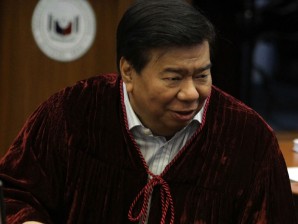Drilon declines Supreme Court nomination
Senator Franklin Drilon has declined his nomination for Chief Justice, saying “it’s more fun in the Senate.”
Drilon said he had no intention of leaving the Senate even if he felt “humbled and honored” by the nomination.
“It is every lawyer’s dream even when we were in law school to be a justice of the Supreme Court and even a Chief Justice,” he told a Senate media forum.
“But I have a mandate from over 15.8 million Filipinos who voted for me. I intend to finish my term in the Senate,” he said.
Only the day before, Senator Miriam Defensor-Santiago also declined her nomination, citing her impending assignment to sit as a judge at the International Criminal Court in the Hague. Besides, the senator said, President Benigno Aquino was not likely to pick her because she voted to acquit ousted Chief Justice Renato Corona.
Article continues after this advertisementDrilon is one of at least three close Aquino allies to be nominated for the position vacated by Corona. The two others—Internal Revenue Commissioner Kim Henares and Justice Secretary Leila de Lima—have yet to accept or reject their nominations.
Article continues after this advertisement‘A circus’
Drilon on Thursday expressed reservations over the selection process being conducted by the Judicial and Bar Council (JBC). With now around 60 nominees, he said the process had become “a circus.”
“Among those nominated were a nurse, a judge who was dismissed because he consulted dwarfs and duwende (elves). It has become a circus. It’s a sad commentary on the process that has evolved. I am not blaming anyone for this. I am just making a comment that it has become a circus, that it has become absurd,” he said.
Meanwhile, lawyer Francisco Chavez on Thursday urged one of the two lawmakers in the JBC to do the country a service and quit the council to avoid a possible constitutional question.
Chavez insisted that allowing Senator Francis Escudero and Representative Niel Tupas Jr. to sit in the JBC at the same time was a violation of the constitutional provision on the composition of the council.
“One of them should resign (so that) this issue would be mooted and we would have a smooth process,” he said.
Composition of JBC
The former solicitor general said he would file a petition with the high tribunal questioning the current composition of the JBC. He said he would also ask the court to issue a temporary restraining order to stop the selection process for the replacement of Corona.
Chavez insists that the Constitution provides for only seven, not eight, members in the JBC, the constitutional body tasked to screen applicants to top judicial offices.
Having both a senator and a congressman in the JBC “deviates from the intention of the Constitutional Commission to remove the influence of politics in the selection process,” he said.
“The purpose of the creation of the JBC is to draw away from the [congressional] Commission on Appointments the selection of each member. That is why there are ex-officio members,” Chavez said.
“All the components of the membership of the council are limited to only one representative (from each sector). Yet, there is now an imbalance because among the components, it’s only the Congress that is entitled to two members,” he said.
He argued that Section 8, Article VIII of the 1987 Constitution plainly stated that only “a representative of the Congress” should be a member of the JBC along with the representatives of the private sector, the academe, the Integrated Bar of the Philippines and the retired justices of the Supreme Court.
The secretary of justice and the incumbent Chief Justice sit in the council as ex-officio members.
However, since 2001, the JBC has been allowing the chairs of the Senate and House justice committees to participate in its proceedings, a situation which Chavez described as an “unconstitutional deviation.”
‘Absurd proposition’
Constitutionalist Fr. Joaquin Bernas Jr. has said, however, that while the charter states that the JBC should be made up of only seven members, it has been the practice to have both a senator and a congressman as members.
Bernas, a Philippine Daily Inquirer columnist and a member of the commission which drafted the 1987 Constitution, said the lawmaker-members were only entitled to half a vote each or they alternated in voting.
But Chavez, who has been nominated for the Chief Justice post like Bernas, said it would be an “absurd proposition” to let a member of the JBC cast only a half vote.
He also clarified that the constitutional question he was raising involved the number of lawmakers in the JBC and not the number of votes allotted to them.
Not keen to change
“I think that opinion (of Bernas) misses the point because the issue is not the number of votes of the representatives of Congress, but the practice of sending two (lawmakers),” he said.
“To assign one-half vote for each of the representatives of the Congress would not only trivialize the votes, but (it would) fractionalize it,” Chavez said.
Lawyer Jose Mejia, the representative of the academe in the JBC, said the council was not keen to change its present composition based on the constitutional questions that Chavez has raised.
“We have decided to adopt the current practice. That’s what we’re accustomed to. The inclination is to continue with the practice unless, of course, directed otherwise by the court,” Mejia said.
